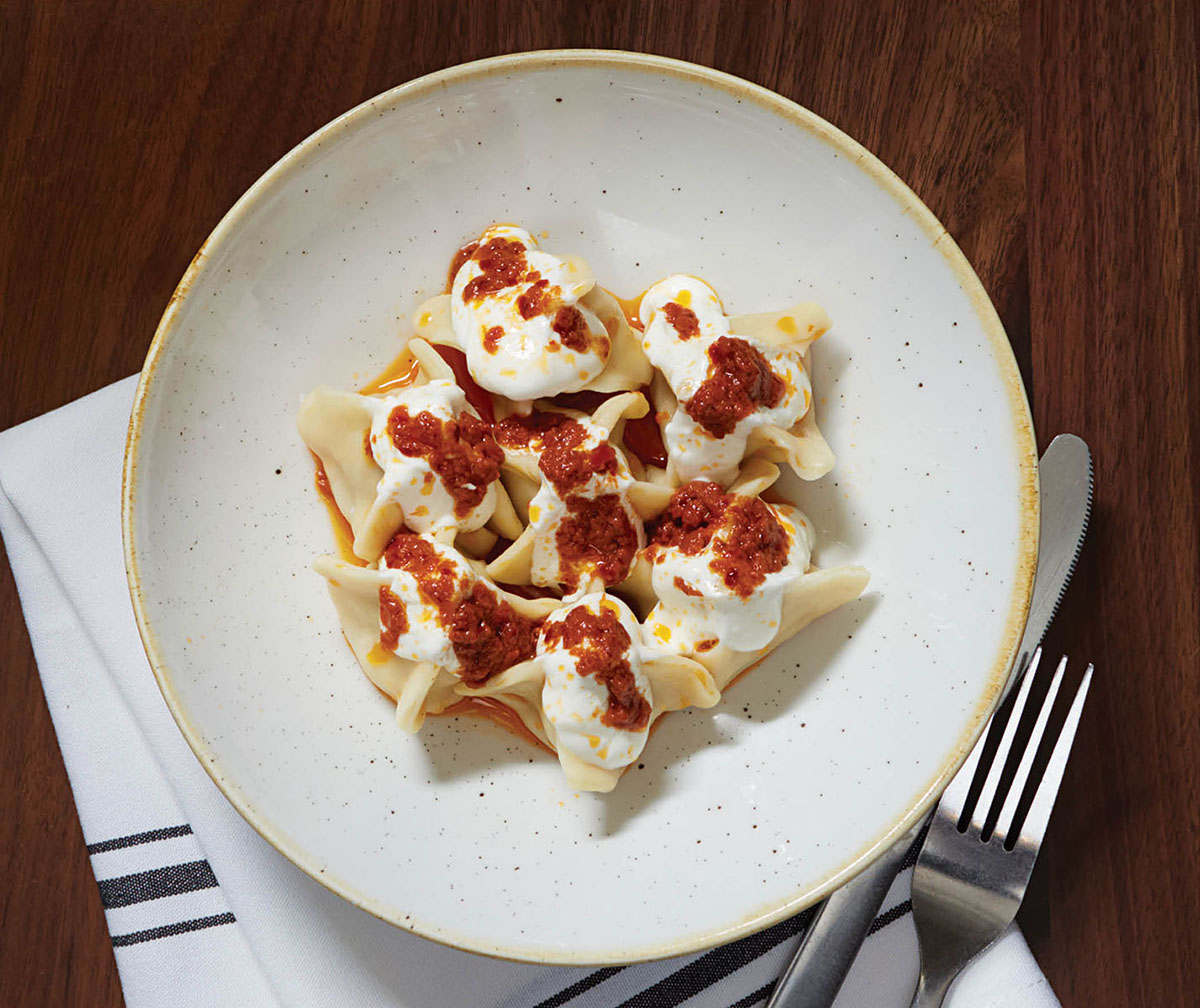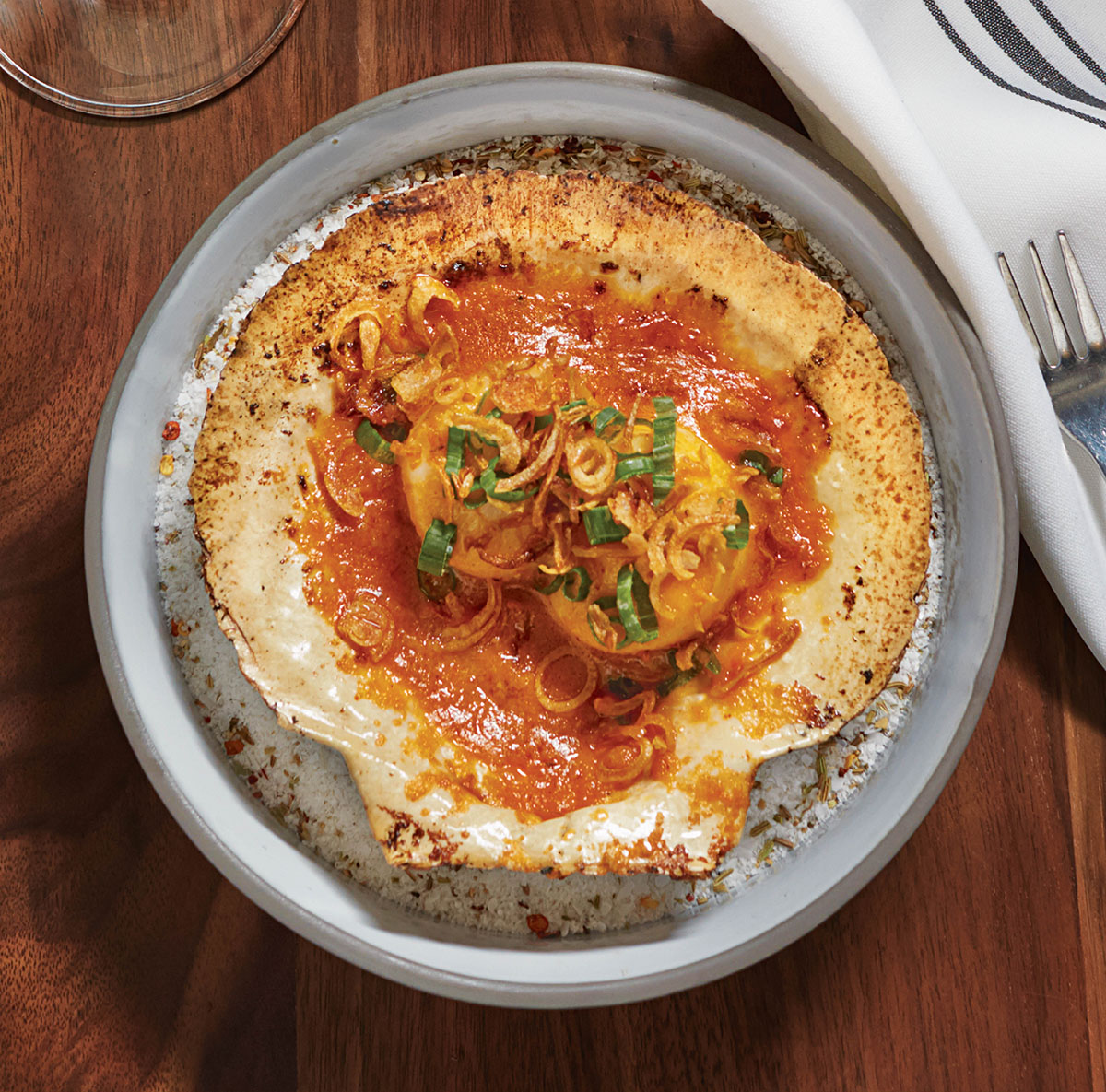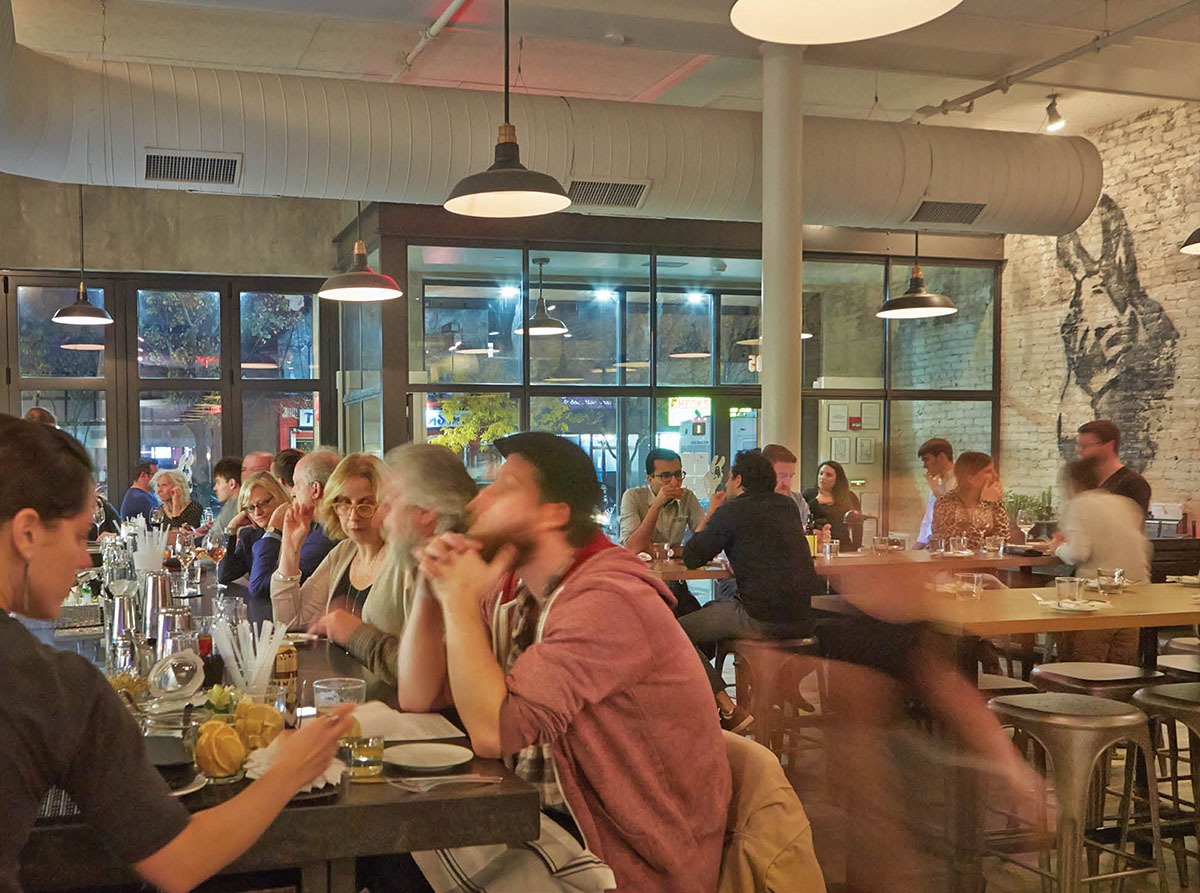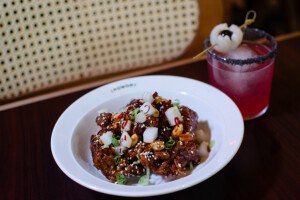Restaurant Review: Little Donkey in Cambridge
The star-studded duo behind Toro and Coppa bring chef-style home cooking to Central Square, one globetrotting “staff meal” at a time.

Manti drizzled with garlic sour cream and Aleppo-pepper butter. / Photograph by Nina Gallant
Ken Oringer and Jamie Bissonnette’s hot mess of a brilliant restaurant in Central Square bills itself as a “global small plates” joint. But the more I eat there, the less I buy it. Not that I blame them. They had to figure out some way to describe their freewheeling concept, and given the menu’s ostensible culinary wanderlust—flavors pinball manically from Indian to Turkish to Peruvian to Chinese, Vietnamese, Korean, Mexican, Jewish, Japanese, Thai, French, and Italian—it’s an appealingly tidy catchall.
But after several visits, I can’t shake the feeling that Little Donkey’s globetrotting pluralism is purely incidental. Despite some territorial overlap, this is not what they’re up to over at Yvonne’s, a boisterous yet ultimately methodical tour of world cuisines. No, this feels far less deliberate. More seat-of-the-pants. It’s in the stripped-down, unshowy platings. It’s in the batshit-random ethos of the menu. A motley parade of dishes whipped up from whatever happened to be in the pantry the day the fish or veggie guy brought in X deluxe ingredient—or better, what a seasoned chef might scrounge up at home on his day off.
That chefs-cooking-for-chefs idea, I’m convinced, is key to understanding the unique approach of Little Donkey. Example: I don’t think the beautiful cardamom-perfumed halibut biryani ($14) was born of some burning interest in Indian grain dishes. I think this is the sort of meal Oringer rattles off at home when a friend shows up unannounced with a few pounds of pristine fish. It is international because Oringer’s pantry happens to be international. Likewise, I think a dish like farro kimchi fried rice ($14) is what happens when Bissonnette surveys his fridge to feed a couchful of peckish buddies, spies some leftover farro and a jar of kimchi, and just cooks. Some scallions, an egg, a few Asian-ish herbs, maybe a splat of green curry paste for good measure. Is that crusty bottom layer some consciously “Spanish fusion” socarrat move? Naw. Pretty sure it’s what transpires after you’ve manned your 5,000th Toro paella and you naturally—instinctually—let it ride.

Barbecue scallop. / Photograph by Nina Gallant
You might even call it “staff meal” fare, after the industry term for the pre-shift sustenance restaurant kitchens cobble together to feed, well, staff—but spruced up with baller ingredients like lobster and caviar for paying customers. It’s Industry Night, every night.
This lyrical spin on gustatory free verse will not be everyone’s jam. But for diners who can hang with the haphazardness, this style of eating can be exhilarating. Oringer and Bissonnette are like DJs who know that exact nexus point to make the seamless connection to the next flavor, the next song. Pitch-perfect, gracefully integrated “nowness” isn’t the only important quality, but it’s a biggie, and these guys have it in spades.
A charcuterie-driven salad of Vietnamese bologna ($11) was a stunning balancing act—pitting hot, salty fried squid against raw cabbage, peanuts, sweet-spicy nuoc cham chili sauce, and unctuous cubes of gently funky house-cured meat: 2017 in a single stanza. Seared foie gras ($14) forwent the usual dessert-y stylings in favor of a welcome hit of vegetal sweetness from green-tomato jam bolstered by herbaceous mint and flowery bee pollen. Fluke ceviche ($13) read as textbook nikkei (Japanese-Peruvian) fusion—and textbook potential flavor overkill—but somehow kept divas like ají amarillo (yellow chili paste), yuzu, and nepitella (Italian mint) from overpowering the soft-spoken star.

The comfortable dining room. / Photograph by Nina Gallant
Every dumpling has its poetry. With manti ($14), Turkish meat ravioli, it’s getting the thick walls of dough cooked through and tender without toughening. It’s nailing the proportions of sweated onion to salt to animal-fat viscosity—the precision counterpoint of hot against cool, luscious garlic sour cream. It is sculpture, not painting: You let the quality of the marble shine through. The chefs “tag” their dumplings right at the end—a graffiti-style flourish in Aleppo-pepper butter—but otherwise they’re deceptively basic. In their noble simplicity, their quiet grandeur, they were perfect.
Some dishes read as miniaturist distillations of bucket-list food memories. The ultimate bite, maybe two. A pair of plump grilled oysters ($12), lavished with white-miso-enhanced butter and Tapatío hot sauce, seemed meant to re-create that formative moment—a childhood beach trip, perhaps?—when you first truly “got” the beguiling alchemy of butter, smoke, capsaicin, and ocean brine. A special called “Toast and a Schmear” ($10) isolated the singular structural pleasures (shattering crispness, creamy saltiness) of the first exemplary bite of a whitefish-slathered bagel—sparing you the inevitable diminishing-returns tedium of bites two through the end.
The same refreshing, improvisatory quality was, on rare occasion, a dish’s downfall. Swordfish with zucchini and almond tabbouleh ($17) could have used a little Aleppo-butter-style pizzazz. Red lentil–kale dhal ($9), likewise, was dutiful and comforting…and dull. And the BLT lettuce wraps ($12) came with amazing house-made lamb bacon, a mound of luscious pimiento cheese, terrific tomato jam—and a cartoonishly stingy number of Bibb leaves.
As a whole, the atmosphere was more inviting and less…imperious than what you’ll sometimes find at Toro, which can feel a tad cliquey to non-regulars. At Little Donkey, there’s a legit neighborhood friendliness. That said, service can feel chaotic, and empty glasses stayed on the table on busier nights. (Bar service—and execution—was consistently flawless.)
Approachability is not something I normally dwell on, but Little Donkey’s menu is funny in that regard. A decent rule of thumb: Enjoyment will be inversely related to the number of food issues—diet, allergy, ethics, cilantrophobia, whatever—a diner walks in with. If you can close your eyes and order whatever dish your finger hits, you’ll adore this place. If you have to sift through the descriptions, you may find it tedious. And once you start clicking on filters like paleo-, pesca-, or plebeian, you fast become aware how taped-together the menu is: A dish like lobster fra diavolo ($26) is way more satisfying if you’re in the mood for spicy, creamy pasta—not defaulting to it because you avoid meat and it’s the seafood option.
Scenario: A chef you admire invites you to a small dinner party. You can bring any three friends. You want to make a good impression. Who can hang?
Voilà. That is your crew for Little Donkey. Now take a seat, close your eyes, and dig in. Let it ride. It’s a lovely way to eat.
★ ★ ★
505 Massachusetts Ave., Cambridge, 617-945-1008, littledonkeybos.com.
Menu Highlights
Donkey Platter, $125
Halibut biryani, $14
Manti (Turkish ravioli), $14
Wok-fried chow fun, $15
Critic Jolyon Helterman’s work has also appeared in Hemispheres, Cook’s Illustrated, and The Week.
★★★★ Extraordinary | ★★★ Generally Excellent | ★★ Good | ★ Fair | (No Stars) Poor


